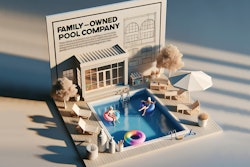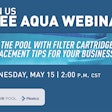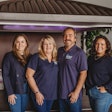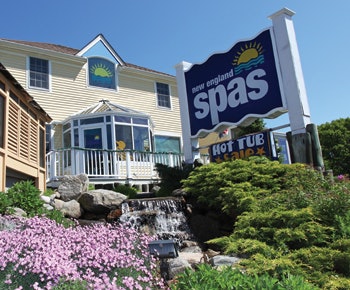
Pool and spa retailers who want to present their products and business practices as eco-friendly face an uphill battle given what many of the products they sell are made of, and how they’re made to work. It’s an often-frustrating battle that Norm Coburn wages daily.
“It’s kind of hard to make yourself look green when you’re in a business that’s far from that. We’re heavily reliant on petrochemicals — everything from insulation in the covers to the acrylic in the hot tubs — and our products consume electricity pretty rapidly and need chemicals to keep them clean,” says Coburn, who owns three New England Spas And Sunrooms locations in the Boston area. “I think everybody tries, and so they do what they can and advertise some of it on their websites. Maybe they’ll talk about how they turn the lights off overnight. Bravo! But, again, we all do what we can.”
For Coburn, it starts with bringing the simple earth-friendly practices he’s accustomed to doing at home into the business. The payoff for these efforts is largely personal, he admits, as the idea of a green hot tub retailer has little currency among his customers. Why do it, then?
“I think we could and should be doing more just as responsible individuals,” he says.
Ecological Awakenings
Coburn’s commitment to the cause started 30 years ago, before he sold his first hot tub. “I was in the solar business back in the early-’80s,” Coburn recalls. “So I’ve always had a commitment to conservation and energy independence and have done things like recycling and all that stuff. I have solar panels on my house that generate hot water, and I also have solar panels that generate electricity. I have a wood stove. So I do anything I can to lower my consumption and electric bills.”
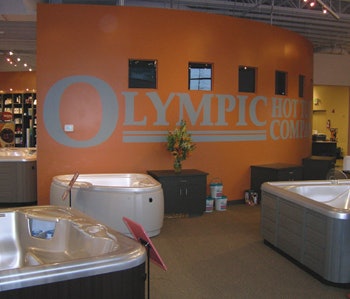

Across the country in Seattle, the owners of Olympic Hot Tub Company also make concerted efforts at greenness — at home and in their store. But even in the Pacific Northwest, an area filled with hardcore recyclers and energy-saving enthusiasts, few show concern for greenness when shopping for a spa, according to Alice Cunningham, who along with her husband, Blair Osborn, owns Olympic.
“I agree with Norm, in that people are not asking about green a lot,” she says. “It’s not the big issue that it was, and I’m not sure why. Maybe we’re having green fatigue, and it’s not the new thing anymore. Or, maybe people just assume that you’re green now.”
The lack of apparent interest in greenness doesn’t deter Cunningham, who says she’s happy to go green for its own sake.
Like Coburn, Cunningham’s a home recycler, saves money on energy costs in the store with efficient lighting and generally wastes little. She also ties another key message hot tub retailers talk about — health and wellness — to greenness.
“When you think of wellness, first you want to avoid chemicals and secondly you don’t want to feel like your skin’s been flayed when you get out,“ she says. “You know, sometimes the weather gets dry, especially in the winter, and people say they can’t use their hot tubs because their skin gets so dry.”
Her solution is Silk Balance, which she uses herself and says has kept her water fresher and her skin softer. It’s not a sanitizer, but rather a water balancer that’s designed to automatically balance pH, alkalinity and calcium hardness. Cunningham describes it as a “water preservative.”
“I had a lady who told me she was going to fill her hot tub in with dirt and use it as a planter, because her kids were complaining about dry skin and red eyes,” she says. “So that irritation, and the smell, were a problem for her. But when we sell the Ace [saltwater generator] and Silk Balance, we never get those kinds of complaints, and the water is always crystal clear.
“I think that’s a huge environmental or green message, and it’s a health message at the same time.”
Coburn likes to tout a less-is-more approach to chemical usage, also with an eye on the environment. While he acknowledges that he makes money selling chemicals, he also closely advises customers on water chemistry and is reluctant to over-prescribe treatments. This approach allows him to feel good about being green, saves the customer money and even reduces the number of times a customer is going to have to change his or her water in a given year.
If he could, he’d sell these carefully dosed chemicals in more-earth-friendly bottles, but so far he’s been unable to source an approved container made with post-consumer materials.
He came close to finding a manufacturer to supply bottles for his private label chemicals, but the company balked at the rigorous material testing and other hoops it would have to jump through to certify the bottles for holding powdered and liquid chemicals. Coburn wanted to proceed, but says they kept questioning him and throwing up roadblocks:
“They’d say, ‘We have to do lots of testing to make sure they’d be sound over time.’ That’s OK. They said ‘It’s going to be expensive.’ That’s fine. They said, ‘Well, the color of the bottles isn’t going to be as good looking.’ That’s fine. Then they asked, ‘Why do you want to do this again?’ Because it’s the right thing to do!
“As far as I can tell, nobody is doing it in the spa business right now. But I’m going to pursue it and ultimately I hope I have some success and that others will follow.”
In the mean time, he sells chemicals in recyclable bottles.
Recycle And Save
At Olympic, Cunningham has instituted a program for disposing of chemical bottles that sends messages both about economy and the environment. Customers who bring in empty bottles of chlorine, shock or any other chemical they purchase at the store can drop the empties off for recycling and save $1 on the next purchase.
Other creative recycling ideas include giving old, waterlogged and worn spa covers to an archery range (cool) and sending the boxes used to ship new covers to a local nonprofit called EarthCorps.
“We have a huge problem with blackberry, ivy, knotweed, all the invasives that grow like weeds and climb up trees and choke out the light,” she says. “So the people at EarthCorps go out and get rid of it, and scrape everything down to the ground, then put cardboard on top of that and cedar chips on top of the cardboard. After about six months you can plant new plants by poking through the cardboard.”
Another guy used the foam in the old covers to make beanbag chairs. There’s a theater company that’s used them to built props and sets, and sometimes gardeners take them to break up the foam and aerate clay-rich soil.
“We’re still looking for a good way to recycle the vinyl,” she says.
Paperless Office
One of the more significant things Coburn has done at New England Spa is to go totally paperless in the service department. He started several years ago by issuing laptops to service techs, which they’ll use to mail invoices and record remarks about service calls.
“When a tech is done with a service call, he can shoot an invoice to the customer before he even leaves the home,” he says. “This does a number of things for us. First, we’re able to communicate with the customer much more quickly and efficiently. If a guy is in his office and wants to know what happened to his hot tub today, he doesn’t have to wait until the gets home to look at the invoice that was left. So, we’ve improved customer service and we’ve eliminated paper completely. I think that was a pretty significant coup.”
Comments or thoughts on this article? Please e-mail [email protected].
SENDING A MESSAGE
Not all green initiatives align neatly with the goals and messages of a hot tub store. Several years ago Alice Cunningham, who owns Seattle’s Olympic Hot Tub Company along with her husband, Blair Osborne, started donating 5 percent from the profits of Silk Balance to a UNICEF program called Tap, which provides clean drinking water to children in developing countries.
“We were looking for a win-win, and while Tap was getting the money for drinking water, which was great, it really didn’t connect with what we do,” she says. “Drinking water and recreational water don’t really make sense together, so I’m going to look for another cause this year.
“One possibility is to donate to a drowning-prevention cause. It’s not green, but it has to do with recreational water, and I think that’s a much better fit, and an easier message to deliver.”






















